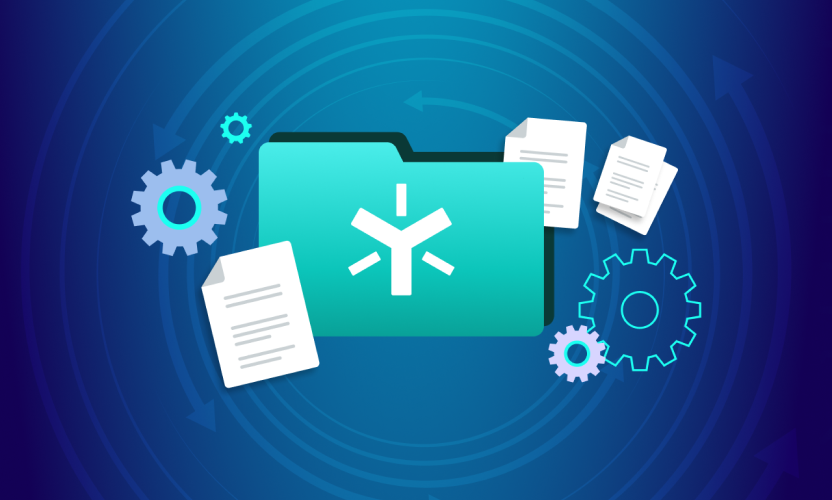Egnyte in the News
"Egnyte's hybrid cloud storage: Twin file shares are better than one"Egnyte's new virtual appliance fuses local network storage with remote cloud storage for fast, easy, and ubiquitous file sharingBy Frank OhlhorstOctober 5, 2010Cloud services provider Egnyte is looking to change how businesses use cloud storage by leveraging a concept called hybrid cloud storage. The company's recently released virtual storage appliance combines the speed of local storage with the resiliency and Internet accessibility of hosted storage, while treating both as a single cloud presence. Egnyte's new offering, called the Enterprise Local Cloud (ELC) solution, works as a virtual machine under VMware virtualization.Hybrid cloud storage requires three primary elements: local storage, cloud storage, and a method to synchronize the two. Add to that a layer of security, remote access based upon a browser connection, and the ability to share files, and building hybrid cloud storage can become a complex task. Egnyte ELC handles those elements with a virtual machine that runs CentOS Linux and Egnyte's software and integrates seamlessly with Egnyte's hosted cloud storage service, the Egnyte Cloud File Server.I tested the ELC virtual machine on a Toshiba notebook computer running VMware Workstation 7.1. For smaller businesses, Egnyte recommends deploying ELC on VMware Workstation because Workstation's low CPU and memory footprint make it well suited to sharing a machine with other applications. For businesses deploying one or multiple instances of ELC on dedicated hardware, Egnyte recommends using VMware ESX or ESXi. Egnyte provides the ELC virtual machine in either format.Installation and setup of the ELC virtual machine was simple, requiring little more than downloading the necessary ELC VM files, configuring a virtual hard drive for storage, and setting up synchronization between the local ELC repository and Egnyte's hosted cloud storage. Once ELC was configured, all that was needed was to define some user accounts, directories, and access permissions. Setup wizards make those chores pretty simple.The ELC configuration is automatically replicated to the corresponding share on the Egnyte cloud, and vice versa. If you have already set up user accounts in the hosted cloud service, a handy screen lets you map local ELC users to hosted cloud users. Once directories are defined, accounts setup, and permissions granted, users can access the hybrid storage cloud. Access to the Egnyte hosted cloud is via a Web browser, while either local ELC or hosted cloud directories can be mapped for direct access from users' desktops.The straightforward and intuitive Web GUI to Egnyte's hosted storage cloud allows users to drag and drop files among private and shared folders, prevent other users from making changes to files they're currently working on, and share files with internal or external users simply by emailing a download URL.Egnyte's hybrid approach solves many of the typical cloud storage problems. Not only do local users avoid sharing large files through slow Internet connections, but all files stored in the local ELC repository are automatically backed up to the cloud, reducing the need for manual backups. What's more, files become portable: Anything saved on site to ELC is also available via the Web by accessing the hosted cloud storage with the proper credentials -- and here again, vice versa.Where Egnyte truly proves to be unique is with the additional file server-like capabilities that it adds to cloud storage. For example, users are able to quickly and simply share files via email from the Egnyte cloud, even with recipients who don't use ELC or Cloud File Server. In those cases, a unique URL is embedded in the email, granting access to the recipient, who just has to click the link to download the file. Other Egnyte cloud features include version tracking, file locking/check-out, and notifications for users who want to know when files have changed. Commands are laid out in a concise fashion in the simple Web GUI, with easy-to-understand descriptions. Savvy users will have no trouble figuring out how to work with the service, and neophytes will pick up on its capabilities very quickly.Egnyte's ELC solution is not the company's first foray into hybrid cloud storage. In addition to native Windows and Mac client software that syncs an individual user's desktop folders with the cloud service, Egnyte offers a solution similar to ELC for the Netgear ReadyNAS and other Linux-based storage appliances -- but based on embedded software not a virtual machine. That solution, called the Office Local Cloud and aimed at small businesses, offers limited scalability compared to ELC. ELC cuts the ties to propietary appliances and can be run on faster, beefier commodity hardware.There are a few nits to pick with ELC. Tighter integration with Active Directory and direct support for SAN and NAS infrastructures (without the requirement of creating a virtual hard drive) would also be welcome additions. However, when it comes to simplifying and speeding up cloud storage, nothing currently on the market compares to Egnyte's ELC, and with prices as low as $50 per month per terabyte, Egnyte makes cloud-based storage surprisingly affordable.Note: Egnyte does provide integration with AD and LDAP: for Large Organizations.Additionally, customers can leverage their own mail system for system generated alerts/notifications.





